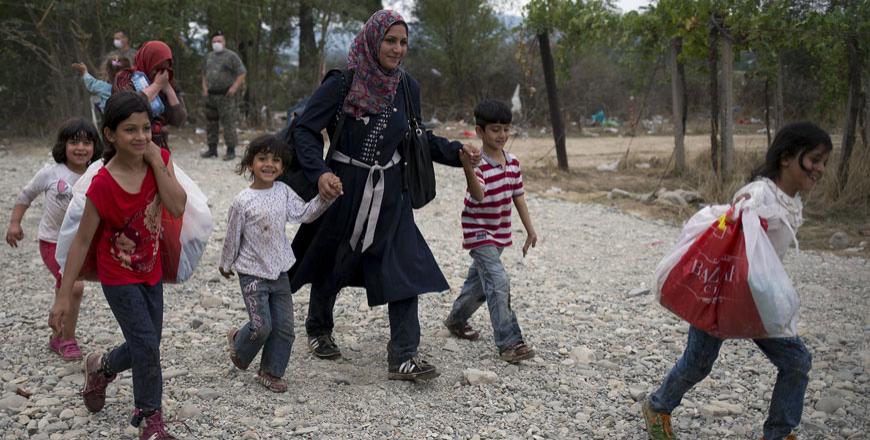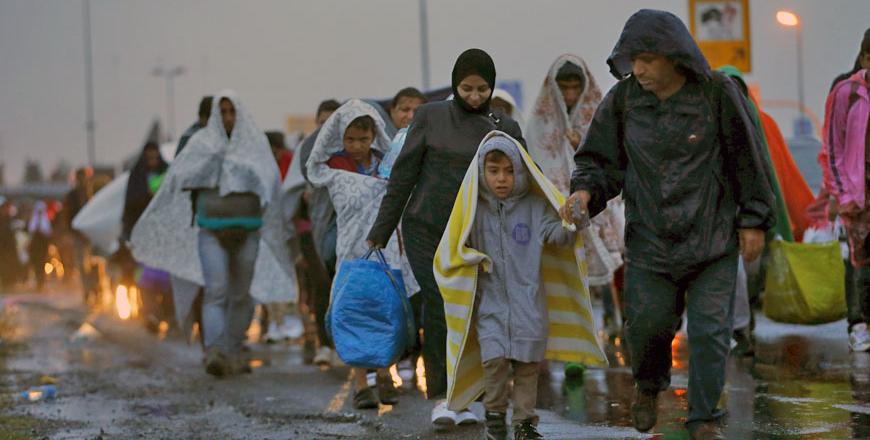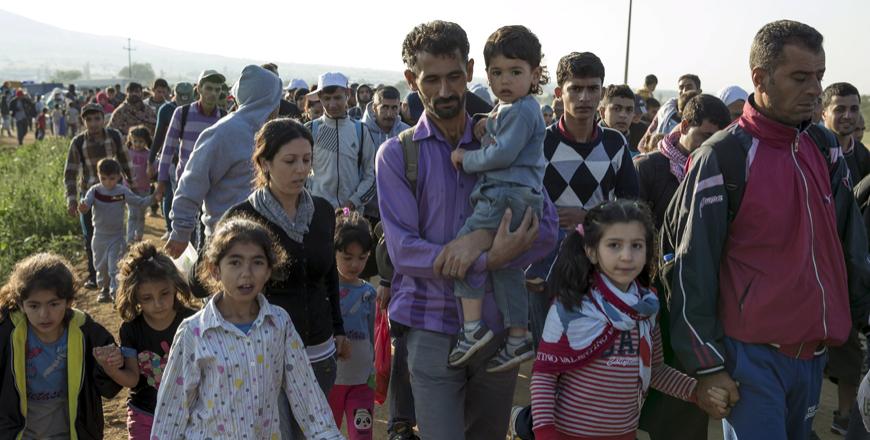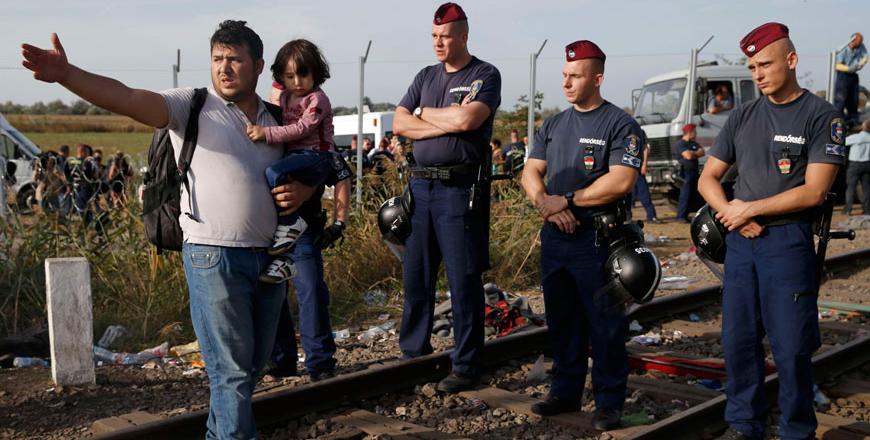You are here
Thousands of refugees arrive in Germany after journey from Hungary
By Reuters - Sep 06,2015 - Last updated at Sep 06,2015

A migrant woman walks with children on a dirty road after crossing the border between former Yugoslav Republic of Macedonia and Greece near Gevgelija, on Sunday (Reuters photo)
MUNICH/BUDAPEST — Thousands of refugees and migrants streamed into Germany on Sunday, many travelling through Austria from Hungary where they had been stranded against their will for days, while European Union governments argue over how to respond.
A convoy of around 140 cars and vans filled with food and water left Vienna to collect exhausted migrants, many from Syria, who had set out to walk the 170km stretch through the rain from Hungary's capital Budapest to the Austrian border, from where many would continue onto Germany.
Onlookers clapped and chanted: "Say it loud, say it clear, refugees are welcome here," as volunteers loaded their vehicles with food, water and soft toys.
However, the EU is deeply divided over how to cope with the influx of people from the Middle East, Africa and Asia, making the 28-nation bloc look ineffective and heartless as member states blame each other, fuelling political populism and anti-Muslim sentiment.
Germany has said it expects 800,000 refugees and migrants this year and urged other EU members to open their doors. But others say the focus should be on tackling the violence in the Middle East that has caused them to flee their homes.
"When rich Europe argues and tears itself apart over whether to accept 1000, 10,000, 42,000 or 100,000 refugees, when Turkey already has 2 million, it is clear that we have a problem of perspective and identity," EU foreign policy chief Federica Mogherini told Italian newspaper Corriere della Sera.
"This crisis can help us come out with a stronger vision of what it means to be the European Union."
Austria and Germany have thrown open their borders to the wave of refugees making their way north and west from the Middle East, Africa and elsewhere. Hungary has been letting the human tide move on after holding it up for days.
A total of 6,800 entered Germany on Saturday with another 5,000 expected on Sunday, Bavarian state officials said.
A dozen or so well-wishers offering chocolate and bananas greeted between 600 and 700 people, mostly from Syria, arriving on two early morning trains in Munich, the state capital of Bavaria.
German Chancellor Angela Merkel's decision to allow the influx caused a rift in her conservative bloc on Sunday with her Bavarian allies accusing her of having pushed forward without asking the federal states dealing with the influx.
The numbers in Europe are small compared to several million refugees in Syria's neighbours Lebanon, Turkey and Jordan and Pope Francis called on Sunday for every European parish and religious community to take in one migrant family each.
But a poll in French newspaper Aujourd 'hui en France showed 55 per cent of French people opposed to softening rules on granting refugee status.
In Hungary, migrants freely boarded trains at Keleti station in Budapest, following handwritten signs in Arabic directing people to trains to Hegyeshalom on the border with Austria. Volunteers handed out food and clothing to hundreds of people at the station.
Austrian police said the flow of people crossing the border from Hungary slowed on Sunday. More than 10,000 have left Hungary since the border was opened on Saturday after thousands spent days camping outside the station amid confrontations with police and chaotic handling by authorities.
Hungary deployed more than 100 buses overnight on Saturday to take the migrants, who had arrived through the Balkans from Greece, to Austria which said it had agreed with Germany to allow access, waiving asylum rules requiring refugees to register in the first EU country they reach.
Wrapped in blankets and sleeping bags, long lines of people, many carrying sleeping children, got off buses on the Hungarian side of the border and walked through the rain into Austria.
"We're happy. We'll go to Germany," said a Syrian man who gave his name as Mohammed; Europe's biggest and most affluent economy was the favoured destination of most.
But on Hungary's border with Serbia there were reports that refugees had spent the night in the rain without food or shelter.
"While Europe rejoiced in happy images from Austria and Germany yesterday, refugees crossing into Hungary right now see a very different picture: riot police and a cold hard ground to sleep on," Amnesty International researcher Barbora Cernusakova said in a statement.
Hungary, the main entry point into Europe's borderless Schengen zone for migrants, has taken a hard line, vowing to seal its southern frontier with a new, high fence by September 15.
Hungarian officials have portrayed the crisis as a defence of Europe's prosperity, identity and "Christian values" against an influx of mainly Muslim migrants.
Ships to Athens
German Interior Ministry spokesman Harald Neymanns said Berlin's decision to open its borders to Syrians was an exceptional case for humanitarian reasons. He said Europe's so-called Dublin rules, which require people to apply for asylum in the first EU country they enter, had not been suspended.
At an EU foreign ministers' meeting in Luxembourg on Saturday, the usual diplomatic conviviality unravelled as they failed to agree on any practical steps out of the crisis. Ministers are especially at odds over proposals for country-by-country quotas to take in asylum seekers.
The flow of people risking the dangerous journey on flimsy boats across the Mediterranean shows no sign of abating, as they flee a four-year-old civil war in Syria that has killed about 250,000 civilians, and wars in Iraq, Afghanistan and in Africa.
On the Greek Island of Lesbos, about 500 Afghans protesting at lengthy identification procedures scuffled with Greek police in the main port. A Greek ferry took 1,744 migrants and refugees to Athens from Lesbos on Sunday and another one with 2,500 migrants was expected later in the day, the coastguard said.
A record 50,000 people hit Greek shores in July alone, and were ferried from islands unable to cope to the mainland by a government in financial crisis and keen to dispatch them into Macedonia, from where they enter Serbia and then Hungary.
More than 2,000 have died at sea so far this year. The Cypriot coastguard picked up 114 Syrian refugees from a fishing boat on Sunday.
The conflict the refugees left behind shows no signs of stopping either.
British Prime Minister David Cameron wants to hold a vote in parliament in early October to allow air strikes on the Daesh terror group in Syria, London's Sunday Times said, and Le Monde reported that France was also considering air strikes, joining a US-led coalition.
The Australian government is due to make a decision within a week on whether to join the coalition.
Related Articles
HEGYESHALOM, Hungary/VIENNA — Austria and Germany threw open their borders to thousands of exhausted migrants on Saturday, bussed to the Hun
ROSZKE, Hungary — A surge in migrants, many of them refugees from Syria, hit Hungary's southern border on Tuesday, passing through gaps in a
ROSZKE, Hungary/VIENNA — Two decades of frontier-free travel across Europe unravelled on Monday as countries re-established border controls


















